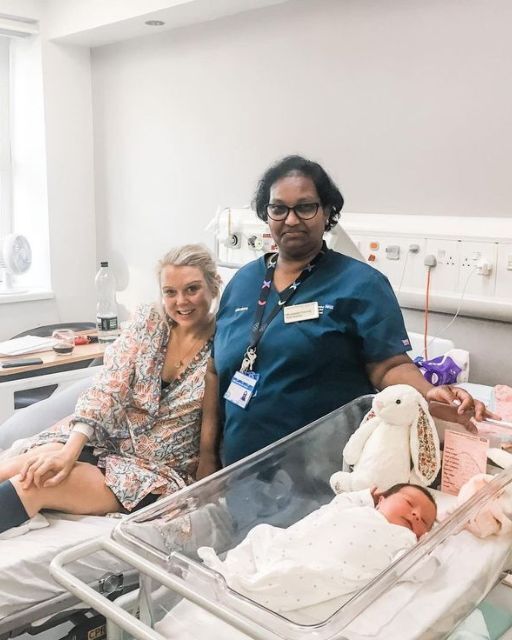I never imagined I’d be the mother-in-law sitting alone in a hospital hallway while everyone else was welcomed with hugs and joyful introductions. Yet just a few days ago, that’s exactly where I found myself—perched on a stiff vinyl chair, clutching a pastel gift bag that suddenly felt out of place and unnecessary. I waited there for nearly two hours, surrounded by strangers coming and going, while the people closest to my son and his wife were waved upstairs without hesitation.

My son Elias, thirty, and his wife Maren, twenty-eight, had just welcomed their first child—a beautiful baby girl. I was absolutely thrilled. I had spent hours crocheting a baby blanket, bought the baby swing from their registry, and even turned down a major work conference to be there for the birth. Elias had texted me at 5 a.m., saying, “She’s here. Everyone’s doing well,” along with a photo of the newborn wrapped in that familiar hospital-issued striped blanket. I cried into my half-burnt toast, overwhelmed with emotion. I texted back to ask when I could visit, and he replied, “We’ll let you know when we’re ready for visitors. Probably late morning.” I didn’t push. I made coffee, double-checked the gift bag, and by 10:45, I decided to go to the hospital just to sit in the lobby, quietly and respectfully, in case they were ready sooner. When I arrived, I noticed Maren’s sister and her husband being cheerfully waved up.
Her parents were already there. No one stopped them. No one asked them to wait. I sent Elias a message: “Hey, I’m downstairs. Should I come up?” No reply. By 12:15, Maren’s best friend arrived, balloons in hand and camera ready. She smiled at the nurse, gave her name, and was directed upstairs without pause. Still no word from my son. I felt the sting of being left out. I started to question everything—had I done something wrong? Was I not welcome? Just as I was about to leave, the elevator doors opened and Elias stepped out, looking completely exhausted. His eyes were rimmed red, and he clutched something in his hand. “Mom, can we talk?” he asked. We walked to a quiet corner near the vending machines, and he sighed deeply. “Maren’s really struggling,” he said. “She’s physically okay, but emotionally… she hasn’t really bonded with the baby yet.
She’s been crying, doubting herself, asking if she’s enough. And now she doesn’t want anyone to see the baby unless she feels completely safe. People she knows won’t judge her.” I paused, stunned. “So… she didn’t want me to come up?” I asked softly. “It’s not about you, Mom,” Elias said quickly. “It’s just… you’ve always had it all together. Maren thinks you’ll see her falling apart and think less of her.” His words struck me deeply. Had I unintentionally made her feel inadequate? I liked being organized and prepared, but I never wanted anyone—especially not my daughter-in-law—to feel small around me. “I don’t care about how together anyone looks,” I told him. “I just want to meet my granddaughter and tell Maren she’s doing better than she realizes. No one expects perfection—least of all from a brand-new mother.” Elias nodded, clearly relieved. “She wants you to be the first person to meet the baby—once she’s ready. She just needs a little more time.” A part of me wanted to argue, to insist I be let upstairs. But looking into my son’s weary eyes, I realized that wouldn’t help anyone. I hugged him and whispered, “Tell her I’m here. I’m not going anywhere.
No judgment—just love.” In the days that followed, I stayed away from the hospital, though it was hard. Instead, I found quiet ways to help. I dropped off meals, tidied up their apartment, and left notes of encouragement scattered around their home, each ending with the same message: You’re amazing parents. Take your time. Then, a week later, I got a text from Maren: “Can you come over tomorrow afternoon? We’d love for you to meet Willow.” Just reading her name brought me to tears. When I arrived, the house smelled like lavender and clean laundry. Maren opened the door with tired eyes but a radiant smile. She hugged me softly and led me inside, where Willow slept soundly in the blanket I had made. I gently touched her little hand, and she gripped my finger. “She likes you,” Maren said quietly, sitting beside me. “I was scared you’d be disappointed in me.” I turned to her and said, “Disappointed? You cry, you forget to eat, you feel lost… that’s called being a mom. None of us get it perfect. We just keep showing up. That’s what matters.” She relaxed, and for the first time, I saw her truly smile. From then on, our relationship shifted. Maren began asking me questions, and I shared stories—not just the polished ones, but the messy ones, too. We connected in a new way, as women learning from each other. One evening, while watching Willow sleep, she turned to me and said, “Thank you. For waiting. I know it wasn’t easy.” “It wasn’t,” I said honestly. “But it was worth it. Because now I see how strong and beautiful you are as a mother.” That moment taught me something lasting—love doesn’t always mean being first. Sometimes, it’s about knowing when to step back, when to wait, and when to quietly be there until someone is ready to let you in. If this story touched you, pass it along. Someone out there might need to hear that it’s okay to need time—and that true love waits patiently at the door.





